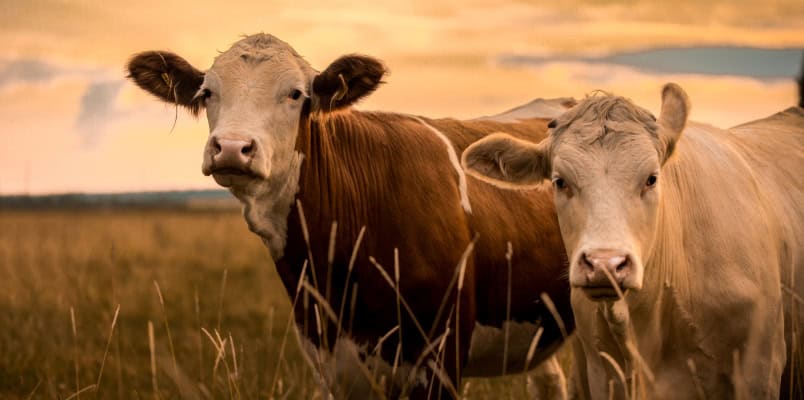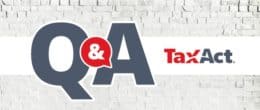Cows, Farming, and Taxes: What You Need to Know


File your self employed taxes with confidence.
Backed by our $100k accuracy guarantee.
Updated for tax year 2023.
If you’re planning to start a farm or already running one, you should know that tax laws for farms can be more complicated than you might think. Even seemingly simple write-offs like livestock can operate differently on your federal income tax return. But don’t worry — we have all the details about what qualifies as a farm and where and how to deduct your farm expenses.
Does my business qualify as a farm?
Have you converted your backyard into a vegetable garden? Do you keep several beehives? How about the chickens, fruit trees, and other cool stuff you’ve included on your property? Well, the IRS judges farm vs. victory garden questions similarly to how it identifies a hobby from a small business. Tax qualifications are determined on a case-by-case basis. To be considered a true farmer versus merely someone with a green thumb, there are specific requirements you’ll need to meet.
According to the Internal Revenue Service (IRS), you’re in the business of farming if you “cultivate, operate, or manage a farm for profit, either as owner or tenant.” Your farming activities can include livestock, dairy, poultry, fish, fruit, or vegetables and operate as a plantation, ranch, range, orchard, or grove.
Here are a few questions the IRS may use to determine if your business qualifies as a farm:
- Do you operate your farm in a businesslike manner and keep detailed business records?
- Do you depend on farm income for your livelihood?
- Does the time and effort you spend on your farm business indicate you intend to make it profitable?
- Do you change methods of operation to improve profitability?
You may not need to answer yes to all, but you must build a detailed case for Uncle Sam, so keeping records of your business and profits is crucial.
Tax Tip: If you and your spouse both materially participate as the only members of a jointly owned and operated farm, you can file as a qualified joint venture.
What kind of farm records do I need to keep?
There is no right or wrong way to keep tax information records for your farming business, as long as you include your business transactions, gross income, and any farm expenses, deductions, and tax credits you plan to report. However, if you’re not sure where to start, the IRS recommends you keep the following kinds of records for farming operations:
- Business expenses for travel, transportation, entertainment, and gifts
- Employment taxes and payroll records
- Excise taxes (you can claim a credit or refund of excise taxes on certain fuels)
- Asset records for farm machinery, farm equipment, and real estate you purchased
- Farm inventory
- Bank and credit card statements for proof of payments
- Tax returns
What tax credits are available to farmers?
The kind of tax credits you can claim as a farmer or rancher depends on the nature of your farming business and the state you live in. Many states offer their own tax credits to help farmers, so be sure to check your state’s specific laws and resources.
The following are examples of some federal tax benefits that may apply to your farming business depending on your situation:
- Fuel Excise Tax Credit: This credit is generally not available to individual taxpayers; it’s designed to help farmers offset the tax charged on certain fuels. Instead of waiting to claim a credit until you file your tax return, you may be able to claim a quarterly refund during the year. The method available to you depends on the type of fuel used.
- Solar Energy Credits: If you purchased a solar energy system for your farm, you may be eligible to claim the investment tax credit or the production tax credit. These credits use different methods, but both reduce your tax liability (head over to gov for more information on how they work and how to qualify).
- Conservation Reserve Program (CRP): While not a tax credit, the USDA’s Farm Service Agency allows farmers to enroll in CRP in exchange for a yearly rental payment to help offset conservation expenses. The CRP is an incentive for farmers to “remove environmentally sensitive land from agricultural production and plant species that will improve environmental health and quality.” CRP contracts typically last 10 to 15 years.
Are there depreciation rules for recovery periods on assets?
Yes. Check with the IRS for specifics on each — hogs depreciate at different rates than equipment or cows, for example. IRS Publication 225 is a great resource for determining how to depreciate certain assets.
Where do I enter asset depreciation on my taxes?
There are two tax forms to be aware of when claiming depreciation for tax purposes. First, enter the asset information on Form 4562, Depreciation and Amortization. The amount will then flow to your Schedule F, Profit or Loss From Farming.
How would I claim a cow as a business expense?
The answer to how to claim a cow as a business expense depends on several factors. Are you a rancher or a dairy farmer? Did you buy your cow or was it born onsite? Interestingly enough, all these things may play a role in how you classify your farm expenses, including cows.
For example, a dairy cow contributes to a farm’s value over its lifetime, making it a capital asset. That’s why its cost can be claimed through depreciation — typically over a five- or seven-year period. If your cow is raised primarily for sale (a meat cow), it’s considered inventory instead.
What happens when a cow doesn’t survive?
If the cow is born onsite but dies and its meat is not sold, there’s nothing to deduct because there’s no basis (purchase price).
If the cow was not born onsite, the tax treatment depends on the type of livestock:
- Dairy cow (capital asset): Record the loss by indicating the livestock was sold/disposed of for no sales price.
- Sale cow (meat cow): Calculate the loss as part of lost inventory.
My farm’s yield varies from year to year. How can I prepare for big tax hits?
The IRS knows farm income often varies from year to year. The tax code allows income averaging for farmers and fishers to smooth out those ups and downs. Income averaging allows you to average your income over a three-year period. This can help your bottom line by not taxing you at significantly higher rates during years when your taxable income is higher. You can make this election on your federal tax return with Schedule J — TaxAct® can help guide you through the steps if you use our tax preparation software.
Additional resources for American farmers
Looking for additional help with farm taxes? The IRS has a Farmer’s Tax Guide, Publication 225, that may provide background for other farm-centric filing asks. TaxAct is also here to help you report your farm income and hang onto more of what’s yours — be it in cash, seeds, or even cows.






